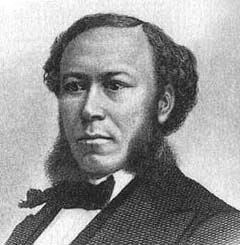|
Intermix.org.uk is a website for the benefit
of mixed-race families, individuals and anyone who feels they have a multiracial
identity and want to join us. Our mission is to offer a view of the mixed-race experience, highlighting icons, film, books, poetry, parenting techniques, celebrities, real lives and much more. Our online forums are a great place to meet others, ask questions, voice your opinions and keep in touch. Sign up for our monthly newsletter and delve into our pages. Want to join in? Become an Intermix member to take part: |
Forgotten Hero Honoured
 Mixed-race soldier had outstanding career.
Mixed-race soldier had outstanding career.
When Billy Jenkinson happened upon a trunk on its way to the dump he had no idea that the contents would reveal the life story of a mixed-race soldier from New York.
In fact for more than half a century Lt. Stephen Atkins Swails has lain in an unmarked grave in Charleston, S.C., his life story largely forgotten.
Billy had known that Stephen was a war hero, a member of the famous 54th Massachusetts Regiment, one of the country's first black fighting units, famous for storming Fort Wagner in South Carolina. The unit's story was told in the Hollywood film Glory. What Billy hadn't known was the story of Stephen's life after the war. Not content with an outstanding military career Stephen had gone on to have an outstanding political one too.
Historians say Stephen was remarkable because after the Civil War, he was one of a few Northern black soldiers who decided to make a new life in the very towns where they'd just done battle. After he was discharged, the mixed-race New York native moved to Kingstree. And less than two years later, he rode the new voting power of emancipated black people to the state Senate on the Republican ticket. It was a victory that the area's white people certainly did not welcome, says Dr. Marvin Dulaney, head of South Carolina's Avery Research Center for African-American History.
'This is a community that had slavery for over 200 years, and they were used to seeing African-Americans in subordinate and subjugated positions,' Dulaney says of the hostile reaction to Stephen's' election. 'And they didn't want to see them with guns in their hands. And they did not want to see them as politicians and serving in office.'
Dulaney says men like Stephen represent that twilight period between the late 1860s and the late 1870s, when black people made political strides and tried to build up their newfound freedom. So in addition to his multiple terms in the state Senate, Stephen was a member of the Electoral College, published his own newspaper, joined the bar and opened a law firm -- with a Confederate Army veteran as partner.
When federal troops withdrew from the South in 1877, Stephen's' political career was basically over. A white mob tried to assassinate him in his new hometown. He resigned from office and, through his Republican connections, got himself a job in Washington, D.C. By the time he died in 1900, states were establishing Jim Crow laws. Black people were now separate, unequal and disenfranchised through poll taxes, literacy tests and intimidation.
Recently, Billy Jenkinson and local historical groups decided to honour Stephen Atkins Swails. They unveiled a five-foot-tall blue granite monument at his gravesite, with a cannon salute, young citadel cadets and a dozen black Civil War re-enactors in rumpled blue Union uniforms.
With songs, drums and cannons, black and white South Carolinians gathered together to remember Stephen Atkins Swails. He is the first to be formally honoured by the new African-American Historical Alliance, but they say he will not be the last.
Source: sanluisobispo.com
